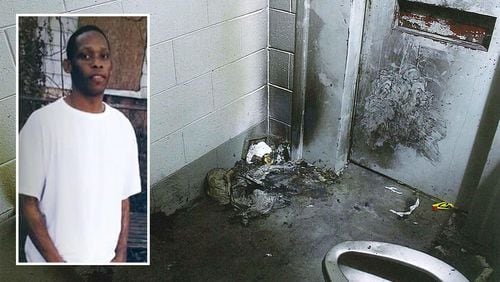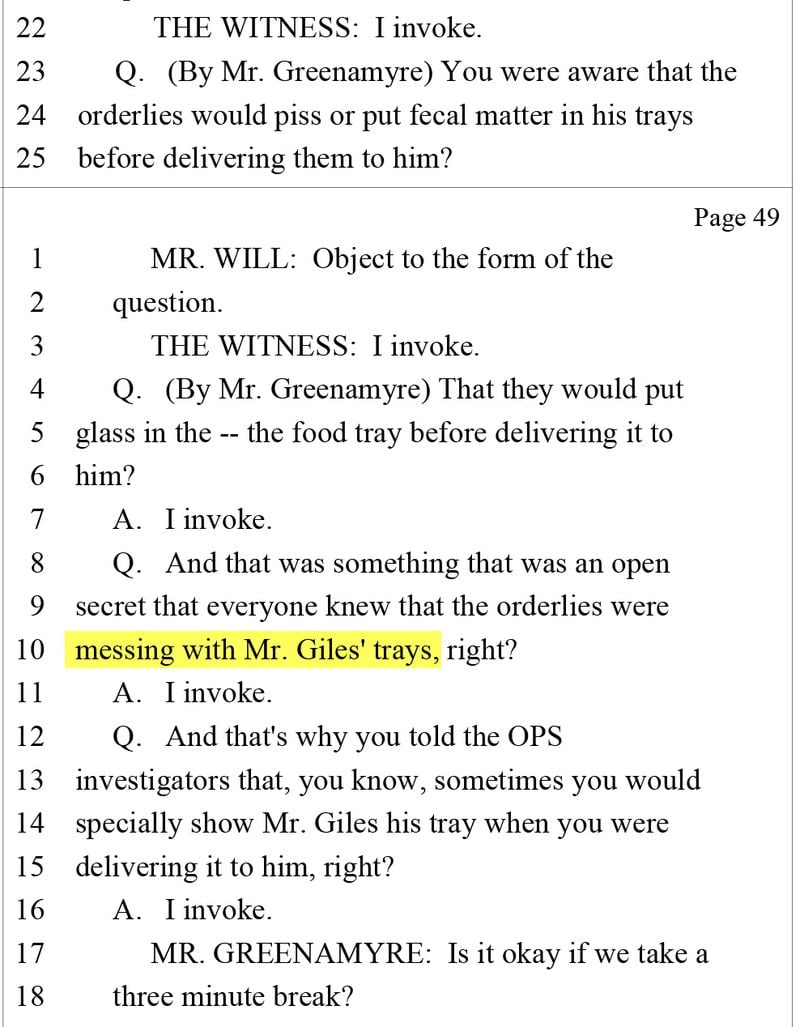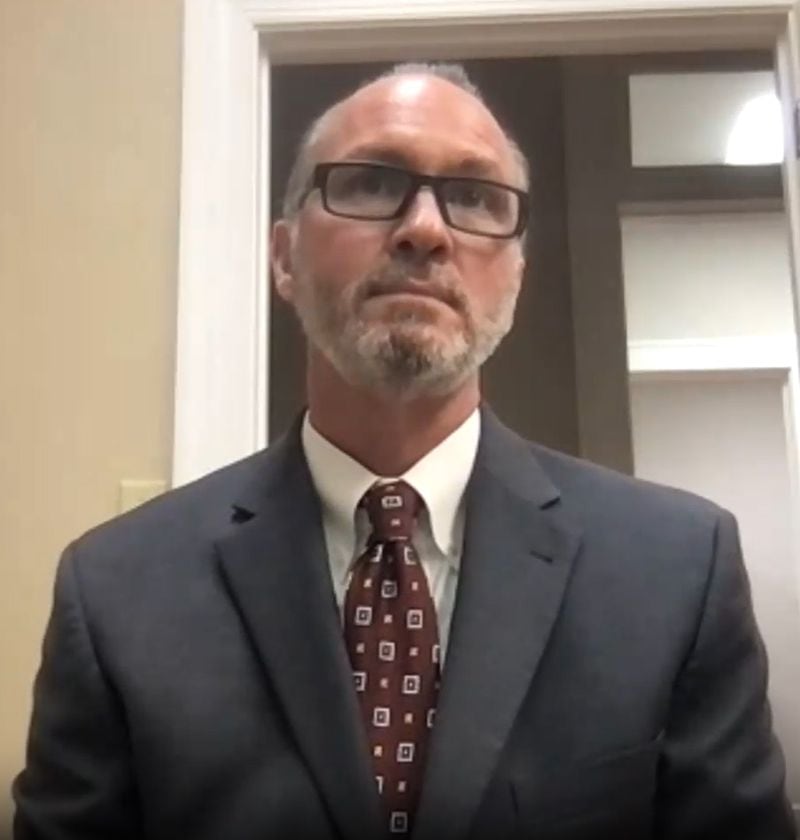Late one afternoon in the mental health unit at Augusta State Medical Prison, Thomas Henry Giles set his mattress on fire, apparently as some form of protest.
Two of the officers assigned to supervise him saw him do it. As smoke clogged the dorm, other prisoners were moved out. But nobody removed Giles from his locked, smoke-filled cell for more than three hours. There, he was left to die.
Giles’ death was quickly ruled a homicide by a GBI medical examiner. The decision was based in part on the Georgia Department of Correction’s own internal investigation, which determined that Giles died because of “the delay and negligence” of officers in removing him from his unventilated cell.
But none of those involved in the 2020 death have been held accountable, in yet another example of the failures of the state prison system. No criminal charges have been filed, nor were the officers disciplined by the Department of Corrections. In fact, one still works for the GDC in a supervisory role at the prison hospital.
Now, the state has agreed to pay Giles’ family $5 million to settle a lawsuit over his death. It’s believed to be the largest amount paid to settle a claim against Georgia over a state prison inmate’s death or injury.
“There were any number of opportunities to have prevented this in the first place or to have done something about it early on or later,” said Zack Greenamyre, one of the lawyers who filed the lawsuit. “Those opportunities have continually gone lacking.”
An examination of Giles’ death by The Atlanta Journal-Constitution, based on court records and other documents, reveals how GDC employees failed to respond as a prisoner with serious mental health issues died in a gruesome fashion. Overwhelmed by smoke from the smoldering mattress, Giles died desperately clawing at his cell door with his hands covered in soot.
Credit: Ga. Dept. of Corrections
Credit: Ga. Dept. of Corrections
At the time of his death, Giles was in building 11B, a lockdown unit at the prison hospital that houses prisoners with severe mental health and behavioral problems. The cells are essentially small rooms with thick doors that have small windows and flaps for delivering food trays. The flaps can only be opened from the outside. Officers are expected to check on inmates every 15 minutes by looking through the windows.
Giles, apparently agitated because he wasn’t allowed to see his counselor, started the fire by using a shank to expose the wires in a light fixture. That was about 2 in the afternoon of Oct. 28, 2020. The two officers who saw him start the fire didn’t try to stop him, nor did they enter his cell when the smoke got so bad that two of the prisoners in the cells below Giles had to be moved. No one, in fact, opened Giles’ cell until much later in the afternoon — sometime after 5 — and by then he was dead.
The autopsy found dense soot in Giles’ mouth and nasal passages. His blood was found to have a carbon monoxide level of 76%. Carbon monoxide levels between 40 and 60% are generally considered fatal.
“While the decedent started the fire himself, based on the investigative reports, prison staff did not attempt to prevent or extinguish the fire and did not remove the decedent from his locked cell for several hours after the onset of the fire,” the medical examiner’s report states. “As such, manner of death is best classified as Homicide .”
The GDC referred the matter to the Richmond County district attorney’s office, which subsequently determined that Columbia County was the more appropriate venue. Augusta State Medical Prison, located in Grovetown, straddles the line between the two counties.
Columbia County District Attorney Bobby Christine told the AJC that his office reviewed the case and referred it to the U.S. Department of Justice in November 2021. He declined to provide additional details.
The DOJ’s civil rights division has been investigating the Georgia prison system since September 2021. It’s unclear whether Giles’ death would figure into that investigation or be considered in a criminal case. The civil rights investigation has focused on prisoner-on-prisoner violence and typically would result in corrective measures, not criminal charges, if civil rights violations are found.
`There’s really no excuse’
The lawsuit stemming from Giles’ death was filed by a team of attorneys from three Atlanta area firms on behalf of one of Giles’ sisters.
The state initially balked at settling but shifted its position as depositions and other evidence made the facts of the case apparent, one of the attorneys, Natanya Brooks, said.
“I think they believed at the beginning they could get a discount on the case because probably that’s what they always do,” she said. “And I think as the case progressed, depositions were taken, they realized that if (the case) went to a jury, a jury was going to care that this is a real person, that this person was murdered, should have been taken out of his cell, and there’s really no excuse from anyone.”
The suit was settled through mediation in September after much of the discovery process had been completed. According to the settlement agreement, $3 million will be paid by the Georgia Department of Administrative Services. An insurance carrier, Lexington Insurance Company, is responsible for the other $2 million.
Although the GDC investigation determined that negligence played a role in Giles’ death, it found no evidence of “foul play.”
“There were any number of opportunities to have prevented this in the first place or to have done something about it early on or later. Those opportunities have continually gone lacking."
The building where Giles died is made up of two units, each with 25 cells arranged in two tiers, upper and lower. At the time, the prison was severely understaffed, and the officers overseeing 11B, Robert Roberson and Marcus Phillips, were each supervising a unit without the help of others. Neither had been with the GDC a full year.
No video of the fire was available, according to the GDC investigation. There were surveillance cameras in the building, but the system was being repaired that day and was inoperable at the time of the fire.
The AJC sent the Department of Corrections an email with questions regarding Giles’ death and the settlement. A spokesperson, Lori Benoit, said the agency could not comment because the matter “remains under federal investigation.”
A tragic upbringing
Giles grew up in Atlanta’s Pittsburgh neighborhood under tragic circumstances. As a child, he witnessed his mother shot to death, Greenamyre said. Not long after that, his father died, forcing him into homelessness, according to the attorney.
In 2016, Giles was arrested and charged with armed robbery for using a handgun to steal $600 from an Atlanta grocery store that January. He also faced a burglary charge for breaking into the same store two weeks earlier, on Christmas Eve, and taking $200 and five packs of cigarettes. In September 2017, he pleaded guilty to an armed robbery charge and was sentenced to 10 years in prison.
At the sentencing, Giles’ attorney, Cameil Reddick, noted that her client suffered from mental health issues that required him to take Remeron, an antidepressant, and Risperdal, a drug used to treat schizophrenia and other mood disorders.
Credit: Ga. Dept. of Corrections
Credit: Ga. Dept. of Corrections
Reddick also asked Superior Court Judge John J. Goger that Giles not be incarcerated at five specific GDC facilities, including Augusta State Medical Prison, because he had been at odds with gang members there. Goger replied that he could make a recommendation, but it would be up to the GDC where Giles would be housed.
Giles’ mental health problems persisted inside the GDC, where he was classified as Level IV, the designation for inmates whose ability to function in the general population is “severely impaired” due to mental illness. According to a counselor interviewed as part of the GDC investigation, Giles suffered from PTSD, cocaine dependency and personality disorder.
Giles also didn’t hesitate to object to things he thought were improper, attorneys said. Chief among his complaints was the belief that the orderlies delivering his food were tampering with it by adding glass and human waste. That complaint and others were well known to prison staff, who acknowledged in deposition testimony that Giles was difficult to handle.
“You know, one day he might talk to you and this and that and the next day he’s just, you know, totally different,” Clifford Brown, the unit manager who supervised Giles’ dorm, testified. “I mean, nobody could really just deal with him. . . . Mr. Giles, he was just a problem every day.”
Conflicting accounts
Prisoners are known to frequently start fires to get attention. Like other prison systems around the country, the GDC has an elaborate set of fire-safety regulations, including a requirement that officers receive four hours of training every year. For those working in a facility with a “hospital component,” the requirement is six hours.
The regulations, in line with those recommended by the National Fire Protection Association, are essential because a fire in a small confined space such as a prison cell can quickly turn deadly, said Curt Floyd, a retired firefighter who serves as a fire protection specialist with the NFPA. Even a mattress made with fire retardant material will smolder for hours, creating a level of carbon monoxide that can kill within minutes, he said.
“You’ve got kind of a configuration of the worst conditions,” he said. “Small space. A smoldering fire with synthetics. And there’s no way to get away from it.”
That’s what happened as Giles’ mattress burned for hours.
Credit: POST files
Credit: POST files
In interviews for the GDC’s investigation, Roberson and Phillips acknowledged seeing Giles start the fire. But, they said, Phillips immediately reported the matter to Reggie Crite, the sergeant supervising them, and Brown, the unit manager.
Phillips told the investigator he mentioned the fire to the two higher-ranking officers several times during the day. “But they did nothing because they did not think it was serious enough.”
In their interviews with the investigator, Crite and Brown said they did not treat the situation as an emergency because they were told Giles had attempted to start a fire but had not actually done so.
“(Phillips) told me, sir, Giles was trying (to start a fire), which he does every day...,” Brown testified in his deposition. “I said, `Is there a fire?’ He said, `No. Everything is all right now.’ I said, `OK.’ ”
A critical element of the investigation was a description of the conditions inside building 11B that afternoon from Brittney Seals, an officer who had gone there to escort prisoners to counseling sessions.
Seals said smoke was visible, making the air cloudy. When two of the prisoners in the cells located below Giles’ complained that they couldn’t breathe, she moved them to a day room, she said. The men had bloodshot eyes and towels around their heads, she said. Even wearing a mask, she said, she was choked by the smoke billowing out of their cells. She said Roberson and Phillips were present when the men were moved yet made no effort to help Giles.
“She stated that neither of the officers went to check on IM Giles and that she did not check on him because she was unaware that Giles had started the fire,” according to a summary of Seals’ interview with the GDC investigator.
In her deposition for the lawsuit, Seals said Roberson questioned why she was moving people out of their cells. She explained it was because they couldn’t breathe. She said Roberson was newer to the job and seemed to be in a situation he didn’t have the experience to deal with.
According to the GDC investigation, Roberson said he told Seals that they were instructed not to open a cell door without a supervisor there for security reasons related to a weapon being found.
Roberson declined to answer questions about the incident when he was deposed for the lawsuit, repeatedly invoking his Fifth Amendment right against self incrimination. Phillips and Crite were not deposed after their attorneys said they would take the Fifth.
Credit: GBI
Credit: GBI
Records show that Phillips and Roberson voluntarily resigned in December 2020. Crite resigned two months later. Brown still works as a unit manager at the prison hospital. Attorneys for the officers did not respond to messages from the AJC.
Credit: Ga. Dept. of Corrections
Credit: Ga. Dept. of Corrections
Edward Philbin, the former warden at Augusta State Medical Prison, acknowledged in a deposition last September that the matter had been mishandled. Even the hint of a cell fire requires immediate action, he said.
“The fact of a cell fire should have initiated multiple responses, even at the beginning,” he said. “Just the response for anything on a fire ... One, you have to get the inmate out, and then you have to go to your notifications, medical check, mental health.”
Philbin, who retired in 2022, said he didn’t take disciplinary action against the officers who resigned because they left the GDC before the department’s investigation had been completed.
Without disciplinary action, the officers have maintained their state peace officer certifications, allowing them to continue to work in law enforcement.
In 2022, Phillips was hired as a correctional officer by the Georgia Department of Juvenile Justice. On his application, he was asked to describe his experience at the prison hospital. “Work lockdown unit as well as assuring the safety of offenders and keeping them safe,” he wrote.
Data specialist Jennifer Peebles contributed to this report.













